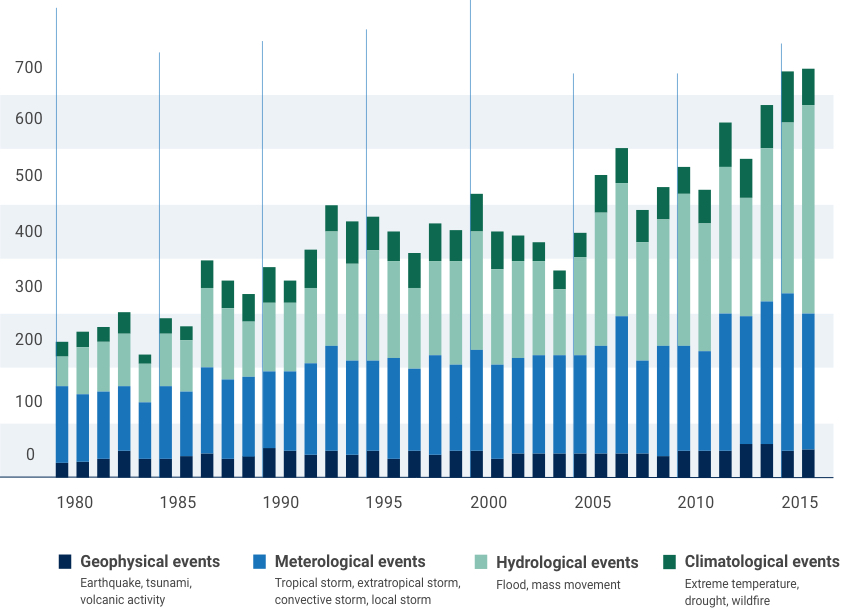Featured Resource
Climate Change Impact Map
Climate & Health Explained
Chapter 1: Linking Climate & Health
Changes to the climate and environment can seriously affect people’s mental and physical health, and can compromise their physical safety, access to clean air, safe water, food and health care, resulting in vulnerability, illness, injury or death.
Even small or gradual changes to the environment can expose people to increased risk.

Many of the devastating climate events that cause death, illness and injuries today, such as heat waves and storms, are becoming more frequent in our warming world.
Number of loss events 1980-2016
NatCatSERVICE MunicheRE, 2017, Topics Geo 2016
From poor air quality, to extreme weather events, to conditions that favour the spread of infectious disease, explore our hazard profiles to learn more about risks and management strategies.
Directly
Primarily through extreme weather, including heat, drought and heavy rain.

Indirectly, through natural systems
For example from warmer and wetter conditions favouring transmission of infectious diseases.

Indirectly, through human systems
For example from occupational hazards, undernutrition, displacement and mental stress.

For example, some populations in temperate areas may be at less risk from extreme cold, and may benefit from greater agricultural productivity, at least for moderate degrees of climate change. Some areas currently prone to flooding may become less so.
However, the overall impact for nearly all populations and for the world as a whole is expected to be more negative than positive, increasingly so as climate change progresses. In addition, the latitude range in the world that may benefit from less cold (e .g., the far north of the Northern Hemisphere) has fewer inhabitants compared with the equatorial latitudes where the burden will be greatest. 1 1Human health: impacts, adaptation, and co-benefits. In: Climate Change 2014: Impacts, Adaptation, and Vulnerability. Part A: Global and Sectoral Aspects. Contribution of Working Group II to the
Fifth Assessment Report of the Intergovernmental Panel on Climate Change
While the direct health effects of extreme weather events receive great attention, climate change mainly harms human health by exacerbating existing disease burdens and negative impacts on daily life among those with the weakest health protection systems, and with the least capacity to adapt.
Most assessments indicate that poor and disenfranchised groups will bear the most risk and, globally, the greatest burden will fall on poor countries, particularly on poor children, who are most affected today by such climate-related diseases as malaria, undernutrition, and diarrhea.
However, the diverse and global effects of climate change mean that higher income populations may also be affected by extreme events, emerging risks, and the spread of impacts from more vulnerable populations. 2 2Human health: impacts, adaptation, and co-benefits. In: Climate Change 2014: Impacts, Adaptation, and Vulnerability. Part A: Global and Sectoral Aspects. Contribution of Working Group II to the
Fifth Assessment Report of the Intergovernmental Panel on Climate Change
The health impacts of climate change are wide-ranging and unequal, and depend on many possible risk factors that often intersect and compound one another.